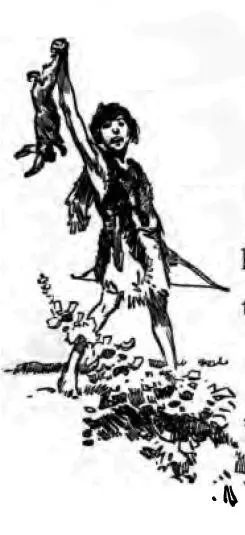He found it when we was herdin' goats down near San José last spring. Hoo-Hoo said it was money. Ain't you hungry, Granser?"
The ancient caught his staff in a tighter grip and urged along the trail, his old eyes shining greedily.
"I hope Har-Lip 's found a crab... or two," he mumbled. "They're good eating, crabs, mighty good eating when you've no more teeth and you've got grandsons that love their old grandsire and make a point of catching crabs for him. When I was a boy—"
But Edwin, suddenly stopped by what he saw, was drawing the bowstring on a fitted arrow. He had paused on the brink of a crevasse in the embankment. An ancient culvert had here washed out, and the stream, no longer confined, had cut a passage through the fill. On the opposite side, the end of a rail projected and overhung. It showed rustily through the creeping vines which overran it. Beyond, crouching by a bush, a rabbit looked across at him in trembling hesitancy. Fully fifty feet was the distance, but the arrow flashed true; and the transfixed rabbit, crying out in sudden fright and hurt, struggled painfully away into the brush. The boy himself was a flash of brown skin and flying fur as he bounded down the steep wall of the gap and up the other side. His lean muscles were springs of steel that released into graceful and efficient action. A hundred feet beyond, in a tangle of bushes, he overtook the wounded creature, knocked its head on a convenient tree-trunk, and turned it over to Granser to carry.

"Rabbit is good, very good," the ancient quavered, "but when it comes to a toothsome delicacy I prefer crab. When I was a boy—"
"Why do you say so much that ain't got no sense?" Edwin impatiently interrupted the other's threatened garrulousness.
The boy did not exactly utter these words, but something that remotely resembled them and that was more guttural and explosive and economical of qualifying phrases. His speech showed distant kinship with that of the old man, and the latter's speech was approximately an English that had gone through a bath of corrupt usage.
"What I want to know," Edwin continued, "is why you call crab 'toothsome delicacy'? Crab is crab, ain't it? No one I never heard calls it such funny things."
The old man sighed but did not answer, and they moved on in silence. The surf grew suddenly louder, as they emerged from the forest upon a stretch of sand dunes bordering the sea. A few goats were browsing among the sandy hillocks, and a skin-clad boy, aided by a wolfish-looking dog that was only faintly reminiscent of a collie, was watching them. Mingled with the roar of the surf was a continuous, deep-throated barking or bellowing, which came from a cluster of jagged rocks a hundred yards out from shore. Here huge sea-lions hauled themselves up to lie in the sun or battle with one another. In the immediate foreground arose the smoke of a fire, tended by a third savage-looking boy. Crouched near him were several wolfish dogs similar to the one that guarded the goats.
The old man accelerated his pace, sniffing eagerly as he neared the fire.
"Mussels!" he muttered ecstatically. "Mussels! And ain't that a crab, Hoo-Hoo? Ain't that a crab? My, my, you boys are good to your old grandsire."
Hoo-Hoo, who was apparently of the same age as Edwin, grinned.
1 comment